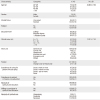Abstract
Purpose
The aim of this study was to examine the validity and reliability of the Korean Version of the Spiritual Care Competence Scale (K-SCCS).
Methods
A cross-sectional study design was used. The K-SCCS consisted of 26 questions to measure spiritual care competence of nurses. Participants, 228 nurses who had more than 3 years'experience as a nurse, completed the survey. Confirmatory factor analysis was used to examine the construct validity and correlations of K-SCCS and spiritual well-being (SWB) were used to examine the criterion validity of K-SCCS. Cronbach's alpha was used to test internal consistency.
Results
The construct and the criterion-related validity of K-SCCS were supported as measures of spiritual care competence. Cronbach's alpha was .95. Factor loadings of the 26 questions ranged from .60 to .96. Construct validity of K-SCCS was verified by confirmatory factor analysis (RMSEA=.08, CFI=.90, NFI=.85). Criterion validity compared to the SWB showed significant correlation (r=.44, p<.001).
Conclusion
The findings suggest that K-SCCS serves as an appropriate measure of spiritual care competence with validity and reliability. However, further study is needed to retest the verification of the factor analysis related to factor 2 (professionalisation and improving the quality of spiritual care) and factor 3 (personal support and patient counseling). Therefore, we recommend using the total score without distinguishing subscales.
References
1. van Leeuwen R, Tiesinga LJ, Middel B, Post D, Jochemsen H. The validity and reliability of an instrument to assess nursing competencies in spiritual care. J Clin Nurs. 2009; 18(20):2857–2869. DOI: 10.1111/j.1365-2702.2008.02594.x.
2. Baldacchino DR. Nursing competencies for spiritual care. J Clin Nurs. 2006; 15(7):885–896. DOI: 10.1111/j.1365-2702.2006.01643.x.
3. Cockell N, McSherry W. Spiritual care in nursing: An overview of published international research. J Nurs Manag. 2012; 20(8):958–969. DOI: 10.1111/j.1365-2702.2008.02366.x.
4. van Leeuwen R, Tiesinga LJ, Middel B, Post D, Jochemsen H. The effectiveness of an educational programme for nursing students on developing competence in the provision of spiritual care. J Clin Nurs. 2008; 17(20):2768–2781. DOI: 10.1111/j.1365-2702.2008.02366.x.
5. McSherry W, Gretton M, Draper P, Watson R. The ethical basis of teaching spirituality and spiritual care: A survey of student nurses perceptions. Nurse Educ Today. 2008; 28(8):1002–1008. DOI: 10.1016/j.nedt.2008.05.013.
6. Ross L, van Leeuwen R, Baldacchino D, Giske T, McSherry W, Narayanasamy A, et al. Student nurses perceptions of spirituality and competence in delivering spiritual care: A European pilot study. Nurse Educ Today. 2014; 34(5):697–702. DOI: 10.1016/j.nedt.2013.09.014.
7. O'Brien ME. Spirituality in nursing: Standing on holy ground. 3rd ed. Sudbury, MA: Jones & Bartlett Learning;2008. p. 129–153.
8. Yoo SY. Analysis of research trends about spiritual care in Korea. Korean J Adult Nurs. 2013; 25(3):332–343. DOI: 10.7475/kjan.2013.25.3.332.
9. Oh PJ, Kim YH. Meta-analysis of spiritual intervention studies on biological, psychological, and spiritual outcomes. J Korean Acad Nurs. 2012; 42(6):833–842. DOI: 10.4040/jkan.2012.42.6.833.
10. Paloutzian RF, Ellison CW. Loneliness, spiritual well-being & the quality of life. In : Peplau LA, Perman D, editors. Loneliness: A source-book of current theory research & therapy. New York, NY: John Wiley & Sons;1982. p. 124–134.
11. Taylor EJ, Amenta M, Highfield M. Spiritual care practices of oncology nurses. Oncol Nurs Forum. 1995; 22(1):31–39.
12. Chung MJ, Eun Y. Development and effectiveness of a spiritual care education program for nursing students: Based on the ASSET model. J Korean Acad Nurs. 2011; 41(5):673–683. DOI: 10.4040/jkan.2011.41.5.673.
13. McSherry W, Draper P, Kendrick D. The construct validity of a rating scale designed to assess spirituality and spiritual care. Int J Nurs Stud. 2002; 39(7):723–734. DOI: 10.1016/S0020-7489(02)00014-7.
14. Lovanio K, Wallace M. Promoting spiritual knowledge and attitudes: A student nurse education project. Holist Nurs Pract. 2007; 21(1):42–47. DOI: 10.1097/00004650-200701000-00008.
15. Bryant FB, Yarnold PR. Comparing five alternative factor-models of the student Jenkins activity survey: Separating the wheat from the chaff. J Pers Assess. 1995; 64(1):145–158. DOI: 10.1207/s15327752jpa6401_10.
16. Kang GN. Validity analyses on Korean spiritual well-being scale. J Educ Eval. 2001; 16(2):111–130.
17. Choi GH. A study of the relationships between spiritual well-being, perception of spiritual needs of patients and spiritual nursing intervention among nurses. J Korean Data Anal Soc. 2014; 16(4):2245–2259.
18. Sung MH. Effects of Spiritual Well-being on Spiritual Nursing Intervention. J Korean Oncol Nurs. 2009; 9(1):15–22.
19. World Health Organization. Process of translation and adaptation of instruments [Internet]. Geneva, CH: Author;2015. cited 2015 March 13. Available from: http://www.who.int/substance_abuse/research_tools/translation/en/.
20. Lynn MR. Determination and quantification of content validity. Nurs Res. 1986; 35(6):382–385. DOI: 10.1097/00006199-198611000-00017.
21. Polit DF, Beck C, Hungler BP. Essentials of nursing research: Methods, appraisal, and utilization. 5th ed. Philadelphia, PA: Lippincott Williams and Wilkins;2001. p. 1–524.
22. Lee HS, Lim JH. Structural equation modeling with AMOS 16.0. Seoul: Hakjisa Corp.;2009. p. 1–312.
23. Geldhof GJ, Preacher KJ, Zyphur MJ. Reliability estimation in a multilevel confirmatory factor analysis framework. Psychol Methods. 2014; 19(1):72–91. DOI: 10.1037/a0032138.
24. Bae BR. Structural equation modeling with Amos 7: Principles and practice. Seoul: CRBooks;2007. p. 1–390.
25. Hong S. The criteria for selecting appropriate fit indices in structural equation modeling and their rationales. Korean J Clin Psychol. 2000; 19(1):161–177.
26. Lee EO, Lim NY, Park HA, Lee IS, Kim JI, Bae J, et al. Nursing research and statistics. Paju: Soomoonsa;2009. p. 1–789.
27. Kim J, Choi S. Influence of self-esteem, empathy and existential well-being on spiritual care competence in nursing students. J Korean Acad Fundam Nurs. 2015; 22(3):328–337. DOI: 10.7739/jkafn.2015.22.3.328.
28. Kim BH, Chung BY, Kim JK, Lee AY, Hwang SY, Cho JA, et al. Current situation and the forecast of the supply and demand of the nursing workforce in Korea. Korean J Adult Nurs. 2013; 25(6):701–711. DOI: 10.7475/kjan.2012.24.6.701.




 PDF
PDF ePub
ePub Citation
Citation Print
Print






 XML Download
XML Download